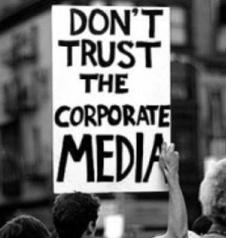By Kaitlyn Paris
The Federal Communications Commission filed a Notice of Inquiry on May 25 asking for public input on its changing media ownership rules. Citizens concerned about proposals to expand corporate control of local television, radio, and print should submit their views within 30 days via the FCC website. The list of 107 topics can be found here, along with Commissioner’s statements outlining the intent and scope of the rules and comments.
The request for public opinion is aimed at gaining information on almost every aspect of media for the purpose of shaping laws that encourage competition, localism, and diversity. In the last two reviews, however, the FCC decided to relax ownership rules across media platforms, giving corporations more leeway in acquiring multiple outlets and triggering an overwhelming backlash from the public.
“I have many times expressed my displeasure with the way this review was handled in its previous two incarnations,” wrote Commissioner Michael Copps in his inquiry statement. “Hopefully, the third time is the charm.”
The deregulation initiatives proposed in 2003 and 2007 were blocked by lawsuits, but with this Notice of Inquiry the process has officially begun anew even as the 2007 decisions are contested in court. “We want to finish this proceeding by the end of the year, but from my experience, it is a very hot button political issue,” FCC Media Bureau staffer Krista Witanowski told the Guardian. “It could take a year to two. The goal is to finish it within the year.”
After the time for comments has lapsed, the Commissioners will review them and issue a Notice of Proposed Rulemaking. “We’re trying to get more concrete information,” Witanowski said. “But that doesn’t mean that when this gets going people won’t make a push for all intensive meetings with Commissioners.”
In preparation for its mandatory four year review, the FCC hosted the last of three cross-country “workshops” at Stanford on May 21. Since 1975 the FCC has banned a single entity from owning both television, newspaper, or radio in one local market. The possibility of increased corporate conglomeration of various media outlets brought together concerned citizens and a mix of panelists for discussion and public comment.
The Internet, big business interests argued, provides sufficient alternative news to avoid monopolization of editorial views and broadcasting resources. Ruth Robertson, a member of the Raging Grannies who protested with signs and cookies outside the workshop, is concerned about the digital divide and its effects on already marginalized groups. “It’s easier for someone younger than me to say the Internet is a whole new world,” said Robertson, citing the ease with which her children learned to use computers and the high proportion of seniors who don’t use the web. “Big media tries to make the case that ‘oh well there’s the Internet so there’s this great variety.’ In actuality you can search a certain topic but you’ll see the same quote over and over again.”
Ravi Kapur, panel member and vice president of KAXT-CA Channel One, contends that current news practices ignore the needs and concerns of Bay Area communities. If deregulation occurs, Kapur is worried that smaller frequencies like his will be quieted. “We’ll be wiped out and the corporations will do the same stuff. You’re not going to get Vietnamese newscasts or newscasts in Tagalog and that’s what we’re doing. Other broadcasters could easily do it but they choose not to, that’s why they complain and say they need to streamline their costs. Why don’t they innovate? I don’t want to encourage competition, but they have more resources than us.”
No Commissioners were present at the conference, though it was moderated by staffers from the Media Bureau. Public opinion weighed heavily on the side of upholding regulations. Tracy Rosenberg, a member of Media Alliance (a group involved in the lawsuit blocking the previous FCC decisions) described the concerns she and other attendees voiced: “As members of the public I think mostly their concerns were previous media consolidations. People anecdotally have seen more wire coverage, more repetitive stories, less independent investigative reporting in their neighborhoods.”
If you didn’t hear about the workshop, you’re not alone. Only one network, KGO 7, turned up to cover it. In the weeks leading to the meeting little was done to draw attention and public participation. Tiffiniy Ying Cheng, panelist and co-founder of the Participatory Culture Foundation, thought the FCC could have reached out to the Palo Alto community. “There were very few students and very few people in general, especially for public comments,” she wrote.
With the Notice of Inquiry the public now has a short chance to submit their opinions online without taking the time to attend a workshop. Even without wading through the 35 page inquiry, most Bay Area community members have some input on the current state of local news, issues surrounding consolidation, big media mergers, or net neutrality. Now is the chance to give the FCC a piece of your mind.

